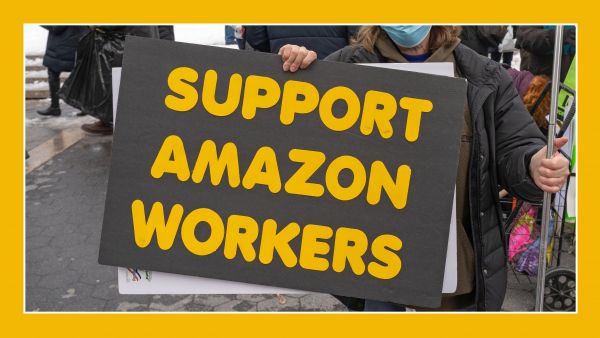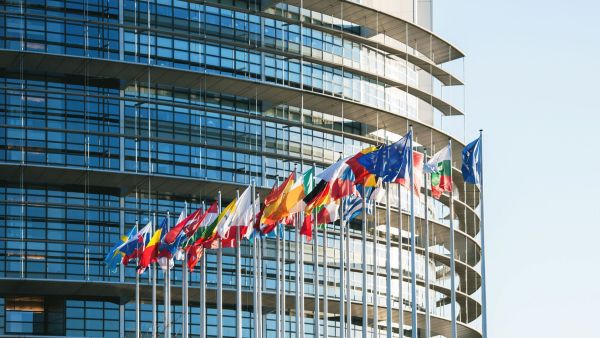As Amazon’s founder Jeff Bezos just reclaimed the title of the richest person on Earth, its workers cannot even take a bathroom break under the pressure of meeting inhumane performance targets.
At the hearing in the European Parliament in January, where Amazon’s chair remained empty, we got a glimpse into horrible working conditions through testimonies of employees. One particular story sticks in our mind – a worker who witnessed an accident and was later fired, to prevent any negative impact on the company. There are reports about every break being closely monitored, about cameras in front of the bathroom door, about workers being treated like robots, slaves, numbers…
There must be no place for such exploitation in Europe. The multinational must respect European rules and values if it wants to do business and make profit in Europe. We must make Amazon pay decent wages and ensure workers’ rights – to treat employees like humans, not robots.
With this mission in mind, the Socialists and Democrats are today organising a Europe-wide Amazon action day, coordinated by UNI Europa, the European Services Workers Union, to meet Amazon workers and UNI Europa affiliated trade unions in Germany, Italy, Spain and the Netherlands. They will discuss how to empower employees so they can stand up to Amazon’s exploitation.
This pledge for more action is the S&Ds’ answer to Amazon’s dismissive attitude. They refused to participate in parliamentary hearings to talk about workers’ rights and they cancelled an official visit by Members of the Parliament to observe working conditions in its warehouses, while trying to influence EU decisions through the back door.
In response, in February, MEPs, trade unions and civil society successfully campaigned to ban Amazon lobbyists from freely entering the European Parliament’s premises. Since the Parliament’s decision and additional public scrutiny, Amazon has updated its registration in the EU Transparency Register. The company now reports spending at least 4.5 million euros on lobbying – up from 2.75 million – making it the seventh largest spender for a single company.
The second step now is to travel across Europe to meet with workers and trade union representatives directly, to listen to their stories and coordinate further action.
Bearing in mind countless testimonies, one obvious course of action is to shield Amazon workers against massive surveillance by ensuring a new ambitious European legislation on artificial intelligence in the workplace, drawing on the example of recently adopted platform work legislation. This means securing the human-in-command principle so only humans can take important decisions, banning the processing of workers’ data through AI, making it mandatory to agree with workers’ representatives about deployment of any AI technology, and adopting serious sanctions, including financial penalties, in case of non-compliance.
Moreover, the next Parliament needs to step up its fight against practices that are enabling workers’ exploitation – disrupting and weakening of trade unions, known as union busting, and the disregarding of collective bargaining agreements.
The full enforcement of the EU minimum wage legislation is key – its objective of 80 percent collective bargaining coverage also applies to Amazon, and it also ensures the access of trade union representatives to workers. Furthermore, multi-employer and sectoral collective bargaining agreements encompassing workers throughout Amazon's supply chain needs to be strengthened. The goal is that there will be no Amazon workplace without workers’ representatives and no Amazon worker without a collective agreement.
Union busting must become a crime so EU member states will be able to impose stiff penalties, including prison sentences, for violations of labour rights and anti-union activities. Trade unions should have unrestricted access to Amazon's facilities, enabling them to effectively represent workers' interests, address grievances, and negotiate fair working conditions.
In addition, the next Parliament must revise the European public procurement legislation to dissuade public funding of Amazon’s social dumping, as well as to prioritise companies upholding labour rights and engaging in collective bargaining. Research by UNI Europa has revealed that Amazon received over €1.3 billion through lucrative public contracts in Europe from 2019 to 2021. The vast majority of the contracts are brought in through Amazon Web Services (AWS), the corporation’s web and cloud computing arm. Even worse, from 2020 to 2022, Amazon received almost 30 million euros for AWS contracts with different EU Directorate-Generals.
To raise awareness of Amazon’s monopolistic practices and exploitation of workers, UNI Europa put together its version of the popular board game, Amazonopoly. The instructions start with a simple objective – try to see if you can win when Amazon already owns everything, from surveillance tools to care and medical products. The multinational is piling up its fortune on the backs of underpaid and mistreated workers. “You paid for all this,” Bezos said to Amazon workers and buyers when he returned from space in July 2021. It is time to make Amazon pay back. It is time to make Amazon play a fair game in Europe.
Agnes Jongerius - S&D Group's Coordinator on the Committee on Employment and Social Affairs












